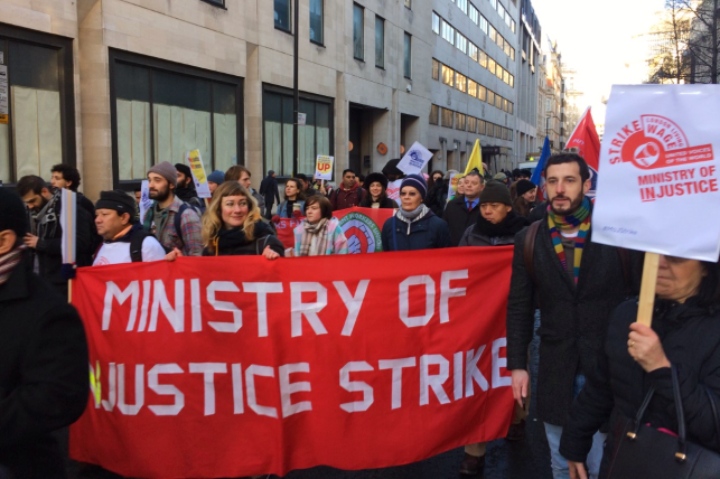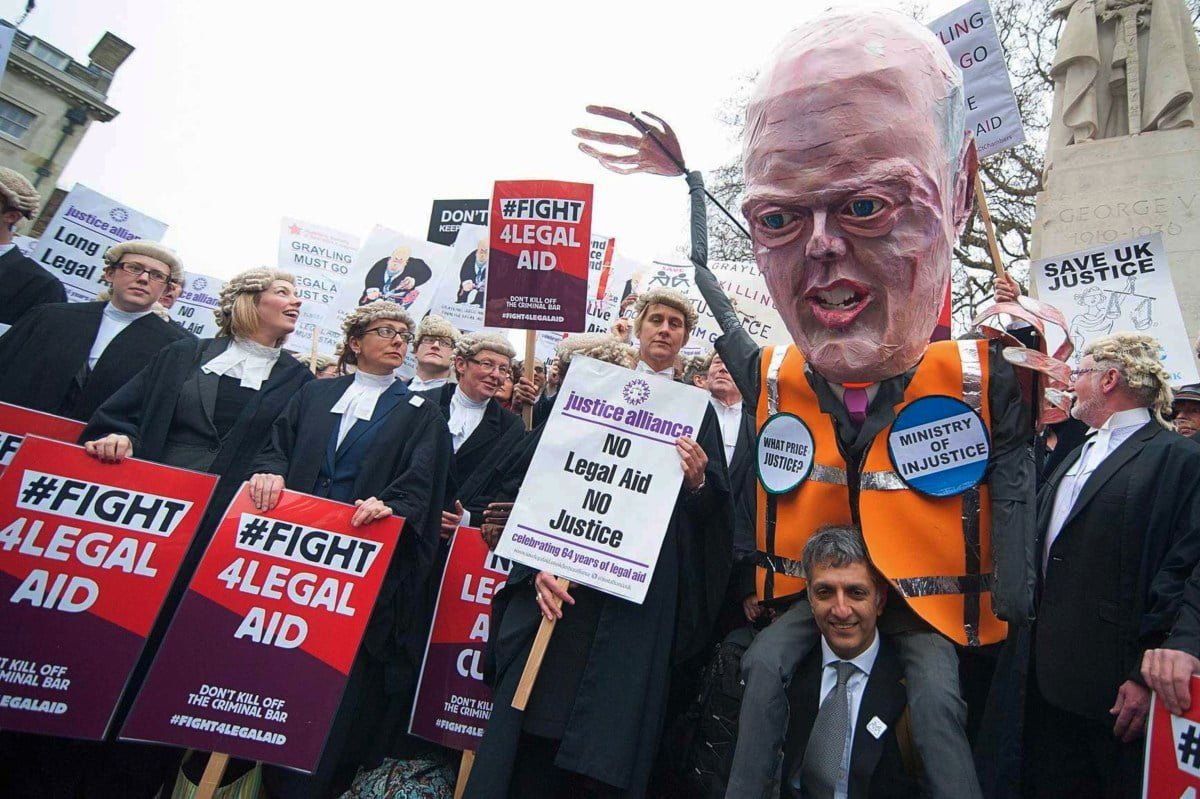Potential strike action by barristers has been suspended following a vote to accept an offer from the Tory government. But the justice system remains mired in crisis. It is only a matter of time until legal workers fight back.
Many criminal law barristers are feeling a sense of betrayal following the results of a ballot to suspend ‘strike’ action. This ballot saw a 60% vote in favour of accepting the government’s offer and calling off the action. There is a widespread feeling that this vote is the result of the extreme pressure placed on barristers by the leadership of the Criminal Bar Association (CBA) to accept the offer.
Barristers had originally voted in favour of taking action from 1 July. The results were astonishing: 95% of prosecution barristers and 94% of legal aid defence barristers voted in favour of the action.
The proposal was for barristers to refuse to attend all hearings on 1 July. In effect, this would close down the criminal courts for a day. They would then refuse any returns indefinitely. These are where another barrister has to take over a case, usually due to the existing barrister being unable to continue at short notice due to a diary clash with another case.
Although a refusal to attend hearings may be considered a radical step for legal professionals, some (particularly younger and more junior) barristers felt that the proposed action did not go far enough. Many rightly believe that only a total shutdown of the criminal courts for a continuous period would force the government to make meaningful concessions.
Under pressure
 For prosecution barristers, the ballot was the result of the totally inadequate fees paid by the Crown Prosecution Service (CPS). The last increase in pay rates was in 2001, with the CBA estimating that this has resulted in cuts of 62% due to inflation. A junior barrister can receive as little as £46.50 for a full day in court, with many other fees being below £100.
For prosecution barristers, the ballot was the result of the totally inadequate fees paid by the Crown Prosecution Service (CPS). The last increase in pay rates was in 2001, with the CBA estimating that this has resulted in cuts of 62% due to inflation. A junior barrister can receive as little as £46.50 for a full day in court, with many other fees being below £100.
It is also worth noting that this is not take-home pay. Barrister have to pay their travel costs and also pay towards their chambers, since they are self-employed and require administrative staff. The end result is that many prosecution barristers are losing money by taking on some cases and have only continued to take them on to prevent the entire criminal justice system collapsing.
For defence barristers, it was considered by many to be a surprise that a significant number had voted in favour of the action. They had previously taken part in action last year and had won some minor concessions from the government. However, the anger still exists, and many felt that significant change was required. Co-ordinated action with prosecution barristers was thought to be the most effective way of putting pressure on the Tory government.
Legal aid rates are slightly higher than those paid to prosecution barristers, with the lowest day rate being £87 for some hearings. After travel expenses and chambers fees though, it is not uncommon for a junior barrister to receive around £20-40 for their efforts in some cases.
One particular frustration is the pay rates for ‘cracked trials’, with the pay rate only being 85% of the rate for a full trial. A cracked trial is where the trial is scheduled to take place but no longer goes ahead on the day, due to either the defendant pleading guilty or the prosecution deciding to drop the case. Since most of the work for a trial is reading and understanding the evidence, many legal aid barristers feel that they are being unfairly penalised when they have already carried out most of the work.
Pathetic offer
The offer made by the government would probably best be described as pathetic. Among other minor changes, the government promised to increase prosecution fees to the same rate as legal aid defence rates, as well as conducting a further review of fees. In other words, increase the fees to the same level that 94% of defence barristers had just voted in favour of striking against.
For defence barristers, the ‘offer’ made was even worse. The government simply promised to bring forward a review of fees to November rather than next year.
In its announcement of the offer, the CBA’s leadership strongly encouraged barristers to vote in favour and frequently claimed that they would be unlikely to get a better result. Even before the result was announced, the words ‘betrayal’, ‘sell-out’, and ‘capitulation’ were frequently heard in reference to the response by the CBA’s leadership.
With the Tory government already in deep crisis, many felt that much more significant and meaningful change could be won. This was clearly possible, particularly considering the speed at which an offer was made when the threat of a single day shutdown of the criminal courts was apparent.
Fight ahead
 It came as a real surprise to many that such an insignificant offer could result in a 95% vote reducing to 40. The reason behind this is the pressure mentioned above, which meant that some barristers felt that the offer would be the best available in the short term. Many barristers also still have a great level of trust in the leaders of the profession and are therefore much more likely to follow their recommendations.
It came as a real surprise to many that such an insignificant offer could result in a 95% vote reducing to 40. The reason behind this is the pressure mentioned above, which meant that some barristers felt that the offer would be the best available in the short term. Many barristers also still have a great level of trust in the leaders of the profession and are therefore much more likely to follow their recommendations.
The suspension of the action, however, is not the end of the fight for barristers. The Tory government and the system as a whole is in crisis. It is extremely unlikely that significant reforms and concessions will be offered when the reviews are conducted.
There must be calls for future action to be coordinated with solicitors and other legal professionals. And legal professionals must link up with the wider labour movement in order to fight against the Tory government and their programme of austerity. Only through coordinated action can we guarantee fair pay and a fair justice system for all.






